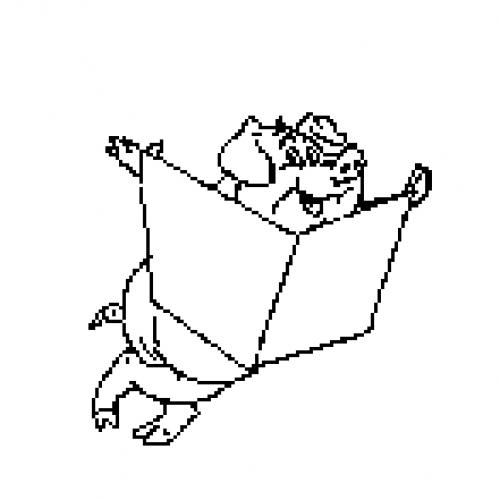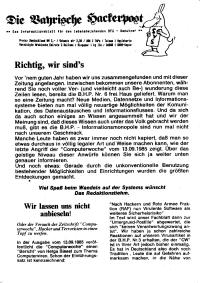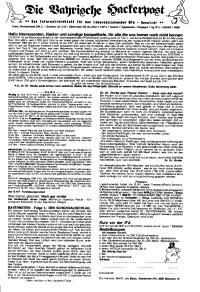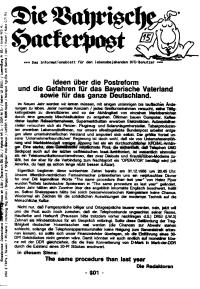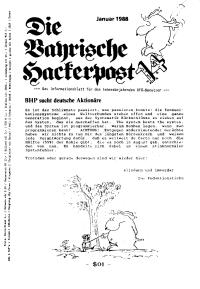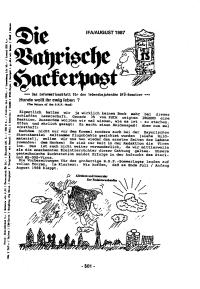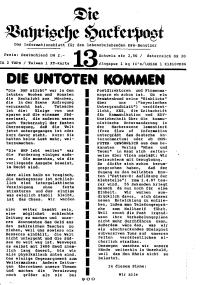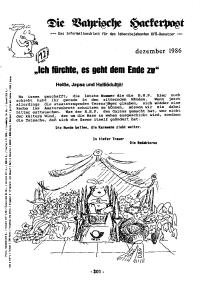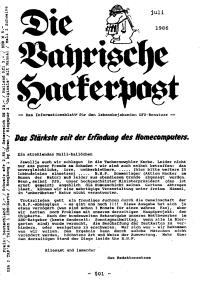Copy Link
Add to Bookmark
Report
Pig Genome Newsletter #061

P I G G E N O M E U P D A T E
__________________________________________________________________
A Bimonthly Newsletter of the U.S. Pig Genome Coordination Program
************** No. 61 **************
* *
* <angenmap@db.genome.iastate.edu> *
* July 1, 2003 *
**************************************
===========================================================================
1. First International Symposium on Animal Functional Genomics held at MSU
2. John M. Airy Visions Genetics Symposium held in Iowa
3. An outstanding NC1004 Meeting was held at MARC, Clay Center, NE
4. Pig Arrays almost ready to share
5. New Grants Program for Functional Genomics of Farm Animals now available
6. World Pork Expo in Des Moines held on June 5-7, 2003
7. Your help in sharing microsatellite primers is needed
8. Next Year's PAG-XII will be held on January 10-14, 2004
9. Upcoming Meetings (5 items)
===========================================================================
The Center for Animal Functional Genomics (CAFG) of Michigan State
University hosted its first International Symposium on Animal
Functional Genomics at the Kellogg Center in East Lansing, Michigan on
May 9-11, 2003. The symposium brought together 130 scientists from
institutions representing 18 countries engaged in high throughput gene
expression profiling for the study of cells, organ systems, and
phenotypes in multiple animal models of health and infectious diseases,
growth and metabolism, reproduction, and bioinformatics/data reduction
(see http://www.isafg.msu.edu for abstracts). Dr. Brad Fenwick (Chief
Scientist, USDA/CSREES/CP/NRI-CGP) opened the symposium with current
information on NRI funding opportunities in the area of animal
functional genomics. Dr. John Gibson (Program Co-ordinator Livestock
Genetics and Genomics, International Livestock Research Organisation,
Nairobi, Kenya) presented an intriguing opening lecture focused on
functional genomics research as it applies to the significant human and
animal health problems in developing countries. The remainder of the
symposium highlighted lectures delivered by a diverse cadre of
outstanding invited speakers, including Dr. Michael Katze (University
of Washington), Dr. Lorraine Sordillo (The Pennsylvania State
University), Dr. Robin Morgan (University of Delaware), Dr. Daniel Pomp
(University of Nebraska), Dr. Tomas Prolla (University of Wisconsin),
Dr. Jerome Strauss (University of Pennsylvania), Dr. James Pru (Harvard
Medical School), Dr. Kathleen Kerr (University of Washington), and Dr.
Bruce Craig (Purdue University). The symposium also hosted a poster
session focused on research of the participants, and exhibits for its
numerous corporate sponsors. Given the symposium's overwhelming
success, CAFG will host a 2nd International Symposium on Animal
Functional Genomics at Michigan State University in spring, 2004.
Please check the symposium web site soon for future dates and details.
o o o o o o o o o o o
The Animal Breeding and Genetics group at Iowa State University and the
Iowa Beef Center hosted the John M. Airy Beef Cattle Symposium, Visions
For Genetics and Breeding on May 15 - 17, 2003 at the Carver Center of
Pioneer Hi-Bred International, Inc. The symposium was sponsored by
John Airy, a well know former Pioneer employee and addressed primarily
genetics questions as they related to the beef industry. However a
number of talks touched on subjects of importance to all molecular
genetic discovery programs. A total of 95 individuals from 13
countries attended and were not disappointed. The talks and discussion
was quite informative and lively. The keynote speaker was Dr. Michel
Georges who presented a fascinating talk entitled "Towards Transgenic
Engineering of the Myostatin Gene in Livestock". Other talks were
outstanding and some had real relevance to pigs. The speakers included
Dr. Jim Womack on "Exploiting Our Knowledge of Genome Evolution: The
Past, Present and Future of Comparative Genomics", Dr. John Pollak on
"Thoughts on Future Directions in Genetic Evaluation of Beef Cattle",
Dr. Moshe Soller on "QTL Mapping and Cloning in Beef Cattle", Dr. Sue
DeNise on "Whole-genome Association Studies to Determine the Molecular
Genetic Value of Cattle", Dr. Graham Plastow on "The Role of Breeding
Companies in Delivering Change: Lessons from the Pig Industry", Dr.
Steve Kappes "Challenges of beef Cattle Genetics Research", Jay Hetzel
on "Delivery of Gene Marker Technology to the Beef Industry", Dr.
Merete Fredholm on "Beyond the Sequenced Swine Genome: The Swine
Transcriptome", Dr. Steve Bishop on "Current Status and Future of
Disease Genetics and Animal Health Research in Relation to Beef Cattle
Production" Dr. Doyle Wilson on "The Road to a New Set of EPDs", Dr.
John Gibson on "Exploiting Genetic Technologies for Global Benefits"
and an informative and amusing wrap-up by Dr. Jerry Taylor. A copy of
the proceedings is now available at a nominal cost by writing
jreecy@iastate.edu and may be on the web at a later date.
o o o o o o o o o o o
An outstanding NC1004 meeting was held at MARC, Clay Center, NE on May
29-31. Hosted by Brad Freking and Daniel Pomp the meeting featured
tours of the facility and talks by a number of MARC scientists on pig
genome work. In addition many stations gave useful and informative
reports of their research efforts. Of particular importance was that
this meeting represented the joining of the previous NC regional
projects on pig gene mapping/molecular genetics and quantitative
genetics. Attended by nearly 40 individuals the group made excellent
progress on developing shared goals and project objectives related to
this area. Two major items of discussion included bioinformatics needs
and achieving the outreach component of NC-1004. The NC-1004
Bioinformatics Working Committee of Chris Tuggle (Co-Chair), Diane
Moody, Scott Fahrenkrug (Co-Chair) and Cathie Ernst was appointed. John
Keele (US-MARC) will be asked if he is willing to join the committee.
Also, Max Rothschild will serve as an ex officio member and Peter
Brayton will be kept informed of committee progress. The committee's
first task will be to develop guidelines for the shared oligonucleotide
arrays that will be distributed soon. Later the committee will
consider other informatics sharing issues. The NC-1004 Outreach
Committee of Rodger Johnson (Chair), Ron Bates, Tom Baas and Steve
Moeller was appointed to consider outreach activities. The committee is
supporting ISU efforts to present a QTL related workshop to industry.
Other accomplishments including working toward a joint effort to
collect health data in pig herds. Our hosts and their colleagues at
MARC deserve a big thank you!
o o o o o o o o o o o
Pig arrays almost ready to share. Materials needed to produce a 13,000
element oligo array have been produced. Thanks to the activities of a
committee from NRSP (Chris Tuggle, Daniel Pomp (co-chairs), Mike
Murtaugh, Diane Moody, Jon Beever and Cathy Ernst) the arrays are
nearly ready for distribution to NRSP-8 and NC1004 members. Pig Genome
Coordinator funds were used to buy the oligos and will be used to
partially fund printing of these oligos on to glass slides. Initial
printing of about 400 slides for the community will take place. To
insure that the arrays are not wasted, individual researchers can
request 20 free arrays and later up to 50 additional ones but they will
be responsible for the printing costs of the additional ones. To
order, please go to the following WWW site:
http://www.genome.iastate.edu/resources/array_request.html and place
an order. Shipping will occur after some initial tests on the arrays
are completed. We owe a big thank you to all that have helped offer
opinions and help, especially the committee for their good work.
o o o o o o o o o o o
New Functional Genomics of Agriculturally Important Organisms grants
program is now available. Research in this area should focus on
tissue-specific DNA microarrays for gene expression profiling as these
gene products are temporally expressed in animals used for the
production of food and fiber, including horse and aquaculture species.
Projects are expected to evaluate the interaction between specific
genetic characteristics and the environmental, social, or physiological
factors that influence the phenotypic expression of characteristics
important for animal production or health. It is anticipated that
approximately $2 million will be available for animal functional
genomics. This program area seeks to support proposals that integrate
research, extension, and education or projects that are multistate,
multi-institutional, or multidisciplinary. Research goals for each of
the supported organismal groups are described below. Extension
activities may include, but are not limited to, collaboration with
plant or animal breeders regarding the application of genomics to the
development of improved agricultural products, or consultation with
disease/pest diagnosticians regarding the development of improved
pathogen/pest detection methods. An example of a multidisciplinary
project would be a project that incorporates computational expertise,
model building, and molecular biology. Applicants are strongly
encouraged to contact National Program Leaders with questions about the
suitability of proposals. Questions regarding the functional genomics
of animals section should be directed to Peter Brayton
(pbrayton@csrees.usda.gov; telephone: (202) 401-4399; fax: (202) 205-
3641).
o o o o o o o o o o o
Producers, sales persons, scientists, and the lay public all attended
the World Pork Expo in Des Moines June 5-7. This provided persons with
good food, ideas of the industry and application of technologies,
including molecular genetics, to the pig industry. The trade fair
reflected financial concerns in the industry and the need for increased
retail prices.
o o o o o o o o o o o
Your help in sharing microsatellite primers is needed!! We have been
sharing over 11 primer sets world wide for the past 10 years and have
run out of them. However, the demand continues from many places around
the world. If you have unused sets and the documentation is still good
and you reside in the US please return them to Max Rothschild, 2255
Kildee Hall, Iowa State University, Ames Iowa 50011.
o o o o o o o o o o o
Next year's PAG-XII will be held January 10-14, 2004 again in San Diego
at the same location. Plenary speakers will begin to be invited soon.
If you have speaker suggestions or other comments, please contact one
of the organizing committee representatives (Abel Ponce de Leon,
apl@umn.edu; Cathy Ernst, ernstc@msu.edu; Bhanu Chowdhary,
bchowdhary@cvm.tamu.edu; Noelle Cockett, fanoelle@cc.usu.edu; or
Martien Groenen, martien.groenen@alg.vf.wau.nl).
o o o o o o o o o o o
Upcoming meetings (see:
http://www.genome.iastate.edu/community/meetings.html)
13th North American Colloquium on Animal Cytogenetics and Gene Mapping,
Louisville Zoo, Louisville, KY, July 13-17, 2003. For more information
please see http://www.uky.edu/Ag/VetScience/NACACGM/ or contact Teri
Lear at equigene@uky.edu.
Transgenic Animal Research Conference IV, August 10-14, 2003,
Granlibakken Resort, Lake Tahoe, California. Register at
http://conferences.ucdavis.edu/transgenic
15th Int'l. Genome Sequencing and Analysis Conference, Sept. 21-24,
2003, Savannah, GA. See www.tigr.org/gsac for further information.
Plant, Animal and Microbial Genome XII, joint with the NAGRP annual
meetings, Jan. 10-14, 2004, Town & Country Convention Center, San
Diego, CA. Please see www.intl-pag.org/ for more information.
ISAG 2004, 29th International Conference on Animal Genetics, Sept. 11-
16, 2004, Surugadai Campus, Meiji University, Tokyo, Japan. For more
information see http://www2.kobe-u.ac.jp/~isag2004/
Additional items can be found at:
http://www.agbiotechnet.com/calendar/index.asp.
<> <> <> <> <> <> <> <> <> <> <>
Items for Pig Genome Update 62 can be sent to me by no later than August 15
please.
Max Rothschild
U.S. Pig Genome Coordinator
2255 Kildee Hall, Department of Animal Science
Iowa State University
Ames, Iowa 50011
Phone: 515-294-6202, Fax: 515-294-2401
mfrothsc@iastate.edu
http://www.genome.iastate.edu
cc: Deb Hamernik, CSREES and Caird Rexroad II, ARS
============================================================================
U.S. PIG GENOME COORDINATION PROJECT
+-----------------------------------+
| Paid for by funds from the NRSP-8 | Web: http://www.genome.iastate.edu
| USDA/CSREES sponsored Pig Genome | Mailing list:
| Coordination Program | angenmap@db.genome.iastate.edu
+-----------------------------------+
============================================================================








